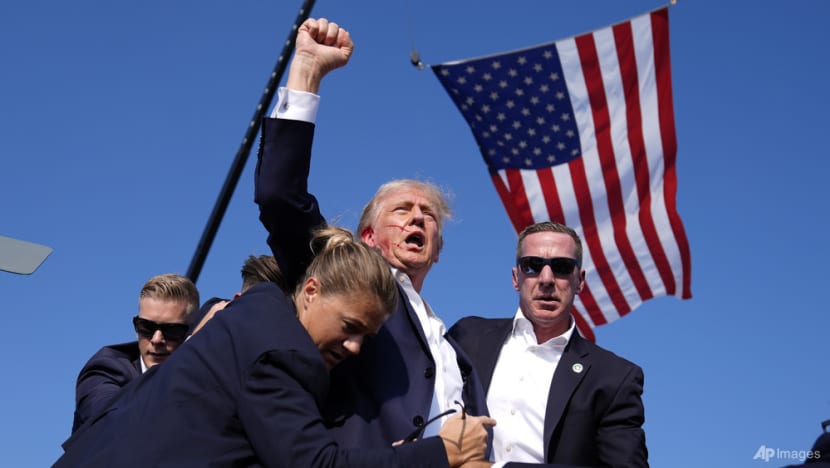Commentary: After Trump's assassination attempt, America is staring into the abyss
After the attempted assassination of Donald Trump, an already existential election is now even more fraught, says Edward Luce for Financial Times.

WASHINGTON: It is not just Donald Trump who dodged a bullet. Half an inch to the left and the cartridge that grazed Trump’s ear would have turned him into a martyr. There is no telling what his death would have unleashed.
As it is, the reprehensible attempted assassination of Trump will have profound reverberations for US democracy. Within seconds of being blanketed by secret service agents, Trump was yelling “fight, fight, fight” to the crowd. The instantly ubiquitous photo of him pumping his fist against the backdrop of the stars and stripes will become the emblem of his campaign.
A high-trust society would have awaited the facts of the shooting before leaping to conclusions. By that yardstick, America is close to the edge.
Two of the Republicans auditioning to be Trump’s vice-presidential running mate blamed Democrats for inciting hatred of Trump. The favourite, Ohio senator JD Vance, said the Biden campaign’s rhetoric “led directly to President Trump’s attempted assassination”.
Tim Scott, the South Carolina senator, said Democrats’ “inflammatory rhetoric puts lives at risk”.
Elon Musk, owner of the site X, formerly Twitter, on which these statements were posted, was quick to weigh in on a conspiracy about how the shooter could have got so close: “Either extreme incompetence or it was deliberate,” Musk wrote.
Many on the left were equally quick to claim that the shooting was a staged or false flag operation to boost Trump’s election prospects. It is notable, however, that no senior Democratic official has yet fanned those rumours.
IDEOLOGICAL ENEMIES
The identity of the suspected shooter, a 20-year-old man called Thomas Matthew Crooks, offered little help. Though he was a registered Republican and an enthusiastic gun owner, he had made a small donation to a pro-Democratic group.
It is plausible that like most US assassins, Crooks was acting alone and delusional. That will not stop political entrepreneurs from blaming the shooting on their ideological enemies.
The biggest question is what Trump will do with it. No honest accounting of America’s fetid climate can ignore the fact that the former president himself is the country’s most influential exponent of political violence.
He described those who stormed Capitol Hill with knives and nooses on Jan 6 2021 as “unbelievable patriots”. He mocked an attack on Paul Pelosi, husband of former Democratic speaker, Nancy Pelosi, after one of his own supporters smashed his head with a hammer. And he encouraged extremist militias to “stand by” shortly before the 2020 election.
In calmer democracies, an incident as lethal as the near murder of a party leader with a AR-15-type semi-automatic rifle would lead to bipartisan calls for gun control. There is no chance Trump’s party will change its mind on that subject.
The number of AR-15s in America has been estimated to be as high as 44 million, which puts comparisons with earlier periods of US political violence into perspective.
IMPLICATIONS ON ELECTION CAMPAIGN
Whether Trump gets a lasting sympathy boost remains to be seen. But three conclusions can already be drawn.
The first is that the Republican national convention in Milwaukee this week will be dominated by his near miss. Trump’s campaign is enormously skilled at choreographing optics to enhance his message. The iconic fist-pumping imagery of the candidate rising courageously from his near death will suffuse the convention stage.
Trump is expected to name his running mate in the next two days - probably on Monday. Expect the nation to be riveted by admiration or dread at the use to which Republicans put Trump’s near martyrdom.
At Trump’s first presidential convention in Cleveland in 2016, the streets around the main hall teemed with private militias brandishing arms. Policing the streets of Milwaukee this week will be an unusually fraught challenge, even by America’s standards.
Second, Joe Biden is likely to get at least a temporary reprieve from the internal Democratic debate about whether he should step down as his party’s nominee. Though it seems far longer, the 17 days since Biden flubbed his CNN debate with Trump have been consumed by an increasingly bitter shouting match between Democrats. The passions behind that dispute - who would be best placed to defeat Trump in November - remain just as relevant.
But the focus will now swing back to Trump. Biden’s campaign said it was suspending its anti-Trump attack ads on Sunday. It will be surprising if that lasts more than a couple of days. There are still five weeks to go before the Democratic convention in Chicago. It would also be a surprise if calls for Biden to quit did not revive.
It is far too soon to speculate - as some were quick to do - that Trump’s already-good election prospects are not now inevitable. In 1981, Ronald Reagan got a huge ratings surge after he was shot by a lone gunman. That boost evaporated within a few weeks.
But it is fair to say that an already existential election is now considerably more fraught than before. Violence was already implicit in much of the rhetoric. Now it is explicit.
It is always tempting to point out that guns and political murder are a staple of the US republic. That is true compared with other democracies. But the conditions in 2024 are unique.
A bullet almost killed the man who is vowing retribution if he is returned to the White House. A spirit of vengeance is haunting America.
















